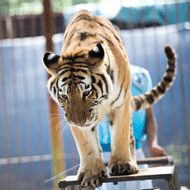
Move follows legislation passed in Scotland in 2017
News that wild animals will be banned from travelling circuses in England within the next two years has been welcomed by the BVA.
In its review of The Welfare of Wild Animals in Travelling Circuses (England) Regulations 2012, the government has committed to introducing legislation banning the use of wild animals in circuses by the time the regulations expire on 19 January 2020.
The BVA has long campaigned for a ban on wild animals in circuses, particularly since legislation was passed in Scotland in December 2017. The legislation, which comes into force later this year, makes it an offence for a circus operator to cause or permit a wild animal to be used in a travelling circus in Scotland.
“While only a small number of animals will be directly affected, this ban goes to the heart of how we think about and treat animals in the world today,” said BVA president John Fishwick. “The use of wild animals in circuses is emblematic of the way we treat animals and we welcome the Government’s commitment to provide imminent legislation to ban the use of wild animals in travelling circuses in England.”
He continued: “Scotland has shown the rest of the UK the way in acting meaningfully through legislation to end animal suffering and improve the welfare of these animals. Now that we have a commitment to similar legislation for England we will be urging to the remaining UK governments to follow their lead.”
News of the ban has also been welcomed by a number of animal welfare organisations, including Animal Defenders International and the RSPCA.
“Having campaigned to stop circus suffering around the world for over 20 years, we’re delighted that a ban is finally imminent,” said Jan Creamer, president of Animal Defenders International. “Circuses cannot meet the needs of animals in small, mobile accommodation and ADI has repeatedly documented suffering and abuse. We congratulate the UK Government on consigning this outdated act to the past where it belongs.”
RSPCA spokesperson David Bowles told i News: “This announcement gives circuses a clear two-year warning that no more licences will be issued and after that, there will be a ban on wild animals in circuses.
"The complex needs of wild animals can never be adequately met in a circus environment and regular transport, cramped and bare temporary housing, forced training and performance are all unavoidable realities for the animals.
“The RSPCA is keen to work with the circus industry to make arrangements for the best possible retirements for the wild animals.”



 The RCVS has announced a new version of its 1CPD mobile app, with enhanced features for veterinary surgeons and veterinary nurses to record their continuing professional development.
The RCVS has announced a new version of its 1CPD mobile app, with enhanced features for veterinary surgeons and veterinary nurses to record their continuing professional development.